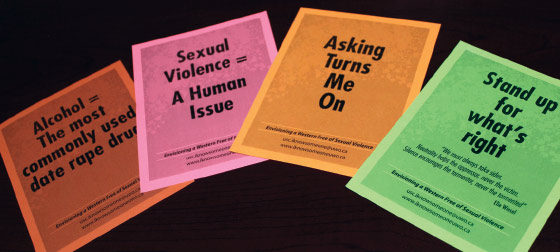Sexual violence a scary reality
 CREDIT: ERIKA FAUST
CREDIT: ERIKA FAUSTPamphlets handed out by the Sexual Assault Centre London tell students what they need to know to stay safe.
You bought a girl a few drinks at the bar, you're hitting on her, and she's 'flirting' back. She seems to be into you, and is getting pretty drunk, she agrees to go back to your place with you. Is it okay to have sex with her? Louise Pitre, executive director of the Sexual Assault Centre in London (SACL) stressed that it is against the law to have sex without consent: "If someone's drunk, they can't give consent, even if there's a 'yes' there."
Lois Wey, manager of Counselling and Accessibility Services at Fanshawe, said that men especially need to be aware of this. "It's very dangerous for young men to assume (yes) because he didn't hear 'no,' or because he pushed a little further and no one pushed him off � or that she 'gave into him' � Continually being aggressive and pushing yourself onto someone, it's not consensual sex."
One in four women who began college or university this September will experience sexual violence by the time they finish school. The risk of sexual assault is four times greater for women aged 16 to 24. Why is sexual assault so common among college-aged women?
Pitre said, "The women are more vulnerable. They're entering either university or college at a younger age, and there are a number of situations that make them a bit more vulnerable."
Wey agreed that it's the nature of these situations that makes it dangerous. "A lot of students are new to London, and they're new to campus. This is a community of 15,000 students. Many of our students who come here come from towns that are smaller than that. They know the good guys, the bad guys; they know the support systems, where to walk and who to call."
Here, everything is new, and that can sometimes create new dangers. Wey stressed that the beginning of the year is a high-risk time. "People have more money, there are more parties at the beginning of the year, there's less work, and people just aren't really grounded yet as to where they fit in this new community."
According to London police, there were 152 sexual assaults and aggravated sexual assaults that took place in London in 2011. Over 60 of those victims were aged 11 to 20, and 42 were between the ages of 21 and 30. Pitre said it's also important to recognize that statistically, only 10 per cent of these crimes are being reported. "Sexual violence is the crime that is the least reported in our country and in our province."
This has become a huge issue, and Wey stressed the importance of reporting these incidences. "They need to make a report for their own well-being, get medical attention if that's needed, get information about their sexual health. And the other reality is that if that student has assaulted someone on campus, they'll do it again, so it helps to protect your peers."
According to SACL, sexual violence can be defined as anything from forced touching, kissing or fondling to forced participation in sexual acts, manipulative sexuality and discrimination based on gender to sexual intimidation, threats and fear.
Approximately 80 per cent of sexual violence incidents are committed by someone the victim knows. The problem is often that we don't suspect it, suggested Wey. "We often think about the bad stranger, the weirdoes out there. The challenge is that sexual assaults are most commonly done by someone the student knows � a friend of a friend, someone they know in class, someone that looks lovely."
Although often times there may be no warning signs involved, Pitre said there are some things to look out for such as whether you're in a healthy or unhealthy relationship, being controlled, and being respected.
You can also be cautious when starting a new relationship. "Don't become too secluded, too intimate too soon with someone you don't really know yet," Wey said. "Take it slower, get to know the person in a safe environment with other people, and do so with less booze and drugs in your system. You're going to get a much better read, especially with a sober mind."
What can you do to protect yourself?
Lisa Andersen, a special constable with Fanshawe Security, recommended students take the Rape Aggression Defence class offered by Fanshawe. "It's a great class. It teaches females how to prepare for those situations and to be a little bit more alert of their surroundings � They do learn physical defence techniques, such as how to get out of a chokehold or how to get out of being pinned against a wall or the ground."
Fanshawe also has a student auxiliary team that provides free safe walk escorts anywhere on campus, 24/7. If an incident does occur, there are many services available in London and on campus. At Fanshawe you can visit Counselling Services in F2010. You can call to make an appointment in advance or, if it's urgent, they do offer same-day appointments in the mornings.
For more information on Women's Safety Awareness at Fanshawe, visit fanshawewsa.com.
For more information about the Sexual Assault Centre London, visit sacl.ca.













